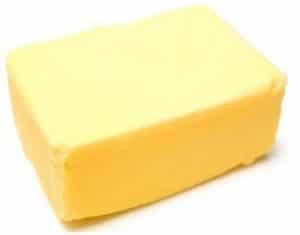- You have no items in your shopping cart
- Subtotal: ₹0.00
Cow Butter Benefits
Cow Butter Benefits
Cow butter, a beloved dairy product, is made from the fat of cow’s milk. It has a rich flavor and is widely used for cooking, baking, and as a spread on bread. Although cow butter has faced criticism in the past for its high saturated fat content, recent studies and shifting public opinion have highlighted its health benefits, making it a staple in kitchens around the world. This article delves into the nutritional profile, health benefits, and potential risks of consuming cow butter.

Nutritional Facts of Cow Butter
Cow butter is primarily composed of fat, making it a high-calorie food. One tablespoon of cow butter contains about 101 calories, which is equivalent to the calories in a medium-sized banana. The table below provides detailed information on the various nutrients found in butter.
Nutrition Facts: Butter, Salted — 100 grams
| Calories | 717 |
| Water | 16 % |
| Protein | 0.9 g |
| Carbs | 0.1 g |
| Sugar | 0.1 g |
| Fiber | 0 g |
| Fat | 81.1 g |
| Saturated | 51.37 g |
| Monounsaturated | 21.02 g |
| Polyunsaturated | 3.04 g |
| Omega-3 | 0.32 g |
| Omega-6 | 2.17 g |
| Trans fat | 3.28 g |
Fats in Cow Butter
Butter is composed of approximately 80% fat, with the remaining 20% consisting mostly of water. As the fatty portion of milk, butter is isolated from protein and carbohydrates. Butter is one of the most complex dietary fats, containing more than 400 different fatty acids.
It is high in saturated fatty acids (about 70%) and contains a moderate amount of monounsaturated fatty acids (about 25%). Polyunsaturated fats are present in minimal amounts, constituting around 2.3% of the total fat content. Other fatty substances in butter include cholesterol and phospholipids.
Short-Chain Fats
About 11% of the saturated fatty acids in cow butter are short-chain (source), with butyric acid being the most common. Butyric acid is a unique component of the milk fat from ruminant animals like cattle, sheep, and goats.
Butyrate, a form of butyric acid, has been shown to reduce inflammation in the digestive system and is used as a treatment for Crohn’s disease. Additionally, it has been linked to improved gut health and enhanced immune function, making it a beneficial component of cow butter.
Ruminant Trans Fats
Unlike the harmful trans fats found in processed foods, dairy trans fats are considered healthy. Cow butter is the richest dietary source of these trans fats, also known as ruminant trans fats, with vaccenic acid and conjugated linoleic acid (CLA) being the most common.
CLA is a family of trans fats associated with various health benefits, including protection against certain types of cancer and the promotion of weight loss. However, while some studies support these benefits, others have raised concerns about the potential harmful effects of large doses of CLA supplements on metabolic health.
Vitamins and Minerals in Cow Butter
Cow butter is a rich source of several vitamins, particularly those associated with fat. The following vitamins are found in high amounts in butter:
- Vitamin A: The most abundant vitamin in butter. One tablespoon (14 g) provides about 11% of the daily recommended allowance.
- Vitamin D: Butter is a good source of vitamin D, essential for bone health.
- Vitamin E: A powerful antioxidant often found in fatty foods.
- Vitamin B12: Also known as cobalamin, vitamin B12 is crucial for red blood cell formation and is only found in foods of animal origin, such as eggs, meat, and dairy products.
- Vitamin K2: A form of vitamin K, also called menaquinone, which may protect against cardiovascular disease and osteoporosis.
Although butter is rich in these vitamins, it does not contribute significantly to the total daily intake because it is usually consumed in small amounts. However, incorporating butter into a balanced diet can help provide these essential nutrients.
Health Benefits of Cow Butter
In the past, cow butter was often considered unhealthy due to its high saturated fat content. However, recent studies have challenged this perception, highlighting the potential health benefits of moderate butter consumption.
Cardiovascular Health
Cardiovascular disease remains one of the leading causes of death globally. For decades, the relationship between saturated fats and cardiovascular disease has been a controversial topic. While it is true that a high intake of saturated fat can increase blood cholesterol levels, which is a risk factor for cardiovascular disease, the type of cholesterol and the overall blood lipid profile are more critical factors.
Studies have shown that saturated fats can improve the blood lipid profile in several ways:
- They raise levels of high-density lipoprotein (HDL), also known as “good” cholesterol, which is associated with a reduced risk of cardiovascular disease.
- While they may increase levels of low-density lipoproteins (LDL), they tend to convert them into larger LDL particles, which are less harmful and not associated with cardiovascular disease.
Many studies have failed to find a significant link between saturated fat intake and cardiovascular disease. In fact, some research suggests that high-fat dairy products like butter may even benefit cardiovascular health. However, it is essential to consume butter in moderation, as excessive intake may lead to adverse health effects.
Obesity and Weight Control
Contrary to popular belief, cow butter is not inherently fattening. When consumed in moderate amounts as part of a healthy diet, butter may help reduce the risk of obesity. A review of studies found that high-fat dairy products, including butter, were associated with a lower risk of obesity.
However, it is crucial to remember that butter is almost pure fat and should be consumed in moderation. It is best used as a cooking fat, spread, or an ingredient in recipes, rather than being the main component of a meal. By incorporating butter into a balanced diet, you can enjoy its rich flavor and health benefits without the risk of weight gain.
Adverse Effects of Cow Butter
In conventional amounts, cow butter does not have many known adverse health effects. However, excessive consumption can lead to weight gain and associated health problems, particularly in the context of a high-calorie diet.
Milk Allergy
Although cow butter is low in protein, it still contains enough allergenic whey proteins to cause reactions in people with a milk allergy. Therefore, individuals with a milk allergy should be cautious when consuming butter or avoid it altogether.
Lactose Intolerance
Cow butter contains only trace amounts of lactose, making it suitable for most lactose-intolerant individuals when consumed in moderation. Cultured butter, made from fermented milk, and clarified butter (ghee) contain even less lactose and may be more appropriate for those with lactose intolerance. Ghee is an excellent alternative to traditional butter for those looking to avoid lactose while still enjoying the rich flavor of butter.
Production of Cow Butter
The production of cow butter begins with separating the cream from the milk. In the past, this was done by allowing the milk to stand until the cream rose to the surface, where it was skimmed off. This process occurs because fat is lighter than the other milk components.
Modern cream production involves a more efficient method called centrifugation, which separates the cream from the milk more effectively. The next step in butter production is churning, a process in which the cream is shaken until the milk fat (butter) clumps together and separates from the liquid portion (buttermilk).
Once the buttermilk is drained off, the butter is further churned until it reaches the desired consistency and is ready for packaging. The quality of butter can vary depending on the production method and the quality of the milk used.
Summary
Cow butter, a product made from the fat of cow’s milk, is a rich source of essential vitamins and healthy fats. While it has been criticized in the past for its high saturated fat content, recent studies have highlighted its potential health benefits when consumed in moderation.
Butter is a versatile ingredient that can be used in cooking, baking, and as a spread. Its rich flavor and nutritional profile make it a valuable addition to a balanced diet. However, it is essential to consume butter in moderation to avoid potential adverse effects, such as weight gain and allergic reactions.
At the end of the day, cow butter can be a healthy and delicious part of your diet, but like all foods, it should be enjoyed in moderation. To experience the benefits of high-quality cow butter, consider incorporating it into your daily meals and enjoying its rich flavor and nutritional benefits.
For more information on cow butter and other dairy products, visit GheeStore. You can also explore a variety of high-quality butter products available at MicroBasket.
